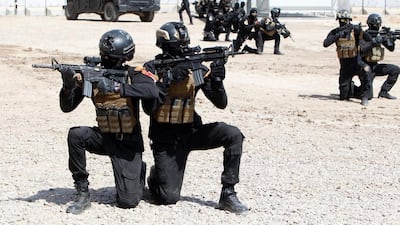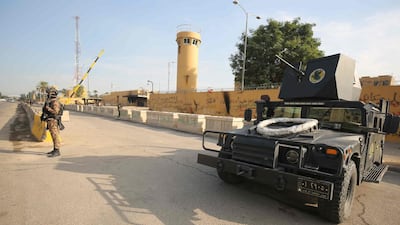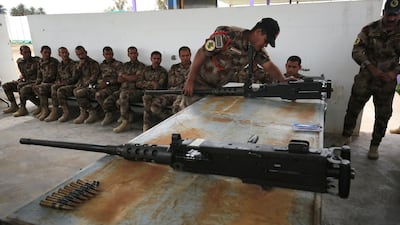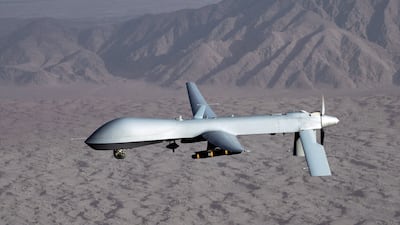The head of ISIS in Syria, one of the top five leaders of the terrorist group, has been killed in an air strike, the US military said on Tuesday.
The US Central Command said Maher Al Agal had been killed in the drone strike in Jindayris, north-west Syria, and a close associate was seriously injured.
“Extensive planning went into this operation to ensure its successful execution," Central Command said. "An initial review indicates there were no civilian casualties."
US President Joe Biden praised the planning of the operation.
"This air strike represents the culmination of determined and meticulous intelligence work and stands as testament to the bravery and skill of our armed forces," Mr Biden said.
Central Command said Al Agal was responsible for developing ISIS networks outside Iraq and Syria.
"His death in Syria takes a key terrorist off the field and significantly degrades the ability of ISIS to plan, resource and conduct their operations in the region," Mr Biden said,
Reports also circulated on social media on Tuesday of a drone strike in Afrin, a district occupied by Turkish-backed Syrian rebels and also home to the town of Jindayris.
The terrorist's death represents another episode in the downward spiral of an organisation which once controlled much of eastern Syria and about a third of Iraq.
The killing would be another blow to ISIS efforts to reorganise as a guerrilla force after losing large areas of territory across the region.
But analysts warn that killing terrorist commanders, sometimes called a "decapitation" strategy, disrupts operations and may not result in the long-term defeat of the terror groups.






The most notorious ISIS commander, Abu Bakr Al Baghdadi, who led the group from its rise until it was able to take over entire cities, died in a US Special Forces raid in October 2019, while hiding out in Idlib, northern Syria.
That province, long a bastion of anti-Syrian regime resistance, had never been controlled by ISIS and was held by militants linked to Al Qaeda.
Al Baghdadi was succeeded by Muhammad Al Mawla, who was killed in a US Special Forces raid in Syria on February 3. Both militants blew themselves up during the raids.
Al Agal’s fate echoed the demise of many ISIS commanders since the group lost tens of thousands of fighters in Mosul ― a bloody urban battle with Iraqi forces backed by coalition air power and advisers that finished almost exactly five years ago.
Three months later, the group lost its last Syrian stronghold of Raqqa.
Without this key terrain and surrounding smaller towns, ISIS lost much of its income gained through taxation of locals. Commanders have been forced to seek shelter in areas no longer under their control.
In Syria, groups tied to Al Qaeda, including a coalition of militants known as Hayat Tahrir Al Sham who occupy Idlib, rose to prominence, attracting former ISIS members who no longer regarded Al Baghdadi's organisation as the most effective militant force.
In Iraq, security forces trained by the coalition have increased their confidence on the battlefield and communities once controlled by the militants are no longer willing to offer them support, traumatised by memories of the terrorists' rule.
Surviving ISIS fighters in Iraq and Syria have been forced to operate in the most remote regions, including Iraq's rugged Hamrin mountains, although the group has had a little more success in eastern Syria.
In June, a large force of ISIS fighters tried to free prisoners from a detention centre run by US-backed Kurdish forces in Raqqa, leading to intense fighting and the death of hundreds of Kurdish fighters and suspected ISIS members.

